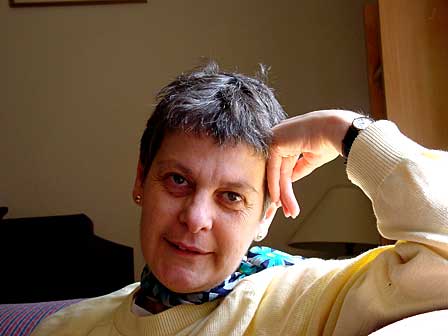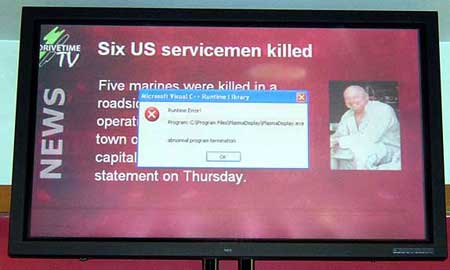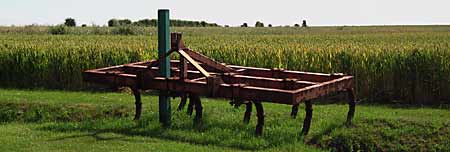If you love Paris, then this site may help to explain why. On a trip to the city in 1989, Christopher Rauschenberg found himself looking at a gate at Saint-Cloud which looked oddly familiar. Then he realised that he knew it from a celebrated photograph by Eugent Atget taken in 1924. This led him to a voyage of discovery — going to the locations that Atget had photographed between 1888 and 1927 and rephotographing them. The results are astounding, simply astounding. The Paris that Atget knew is still there — and astonishingly untouched by development. See for yourself.
Three years on

It’s three years since Sue died. Today was a lovely mild early-Autumn day. I got up early before the children woke and went by myself to her grave in the village churchyard. It was wonderfully peaceful and still. Impossible in one sense to believe that three years have passed. Impossible in another to believe that it isn’t ten.
One thing I have noticed this year, as the time of her death grows more distant, is that I think a lot about hypotheticals. What would she think about such-and-such if she were to appear now? What would she make of her children, now so much more grown-up than when she left us? What would she make of the chaotic state of the house? (I know the answer: as a fantastically orderly and tidy person she would be mightily pissed off!) Would she be worried by me going round London by Tube? (Yes.) What would she think about the war in Iraq? (She would have been keen to get rid of Saddam.) And so on…
So she lives on, in my mind, still a direct presence in my life. When, two days before she died, I decided I had to tell the children what was about to happen, and we had the most agonising conversation that any father can ever have, I said that when someone you love dies, they live on in your heart. I said that I expected Mum always to be perched on my shoulder, rather like a pirate’s parrot. Then Annie said, through her tears, “They also live on in their children. I’ve got Mum’s looks (which she has) and your eyes and…”. She paused: “… and your temper!” And Tom added: “And I’ve got Mum’s tidiness gene” (which he has).
Today, we all went out for a lovely lunch in her favourite restaurant (which also happens to be in our village) and then we went to a garden centre and bought a lilac tree which I then planted in the front garden where she had planned to put it. And at 15:08 I stamped on the earth and muttered (to my left shoulder): “Well, you can tick that off the list now, sweetheart!” (Because she left a list of things to be done, and I’m not making as much progress on it as I should.)
One of the nicest things today was that I found this photograph in my digital shoe-box. It was taken by my eldest son in April 2002, when we knew she was dying. Her hair had grown back in a beautiful wiry thatch of which she was very proud. It’s a great picture because it shows both her tenderness and her strength. It reminds me of how lucky I was to be loved by her; and of how much I miss her.
Waiting for Godot
Fifty years ago tonight, the theatrical world was turned upside down. Peter Hall’s production of Sam Beckett’s Waiting for Godot premiered in London. I’ve always thought that only Ken Tynan did it justice, in his Observer review. This is what he wrote:
By all the known criteria, Samuel Beckett’s Waiting for Godot is a dramatic vacuum. Pity the critic who seeks a chink in its armour, for it is all chink. It has no plot, no climax, no denouement; no beginning, no middle, and no end. Unavoidably, it has a situation, and it might be accused of having suspense, since it deals with the impatience of two tramps, waiting beneath a tree for a cryptic Mr Godot to keep his appointment with them; but the situation is never developed, and a glance at the programme shows that Mr Godot is not going to arrive. Waiting for Godot frankly jettisons everything by which we recognise theatre. It arrives at the custom-house, as it were, with no luggage, no passport, and nothing to declare; yet it gets through, as might a pilgrim from Mars. It does this, I believe, by appealing to a definition of drama much more fundamental than anything in the books. A play, it asserts and proves, is basically a means of spending two hours in the dark without being bored.
Peter Hall has written a nice piece about the premiere in today’s Guardian. He compares Godot with that other iconic play, John Osborne’s Look Back in Anger.
Look Back in Anger was a play formed by the careful naturalism of the 30s and the craft beloved by the old repertory theatres. It now looks dated and prolix because it uses the convention of the old well-made play. I think that my generation heard more political revolution in it than was actually there – largely because we desperately needed to.
By contrast, Waiting for Godot hasn’t dated at all. It remains a masterpiece transcending all barriers and all nationalities. And it could have been written today: there is nothing of the 50s about it. It is the start of modern drama and it gave the theatre back its metaphorical power.
Godot challenged and then removed 100 years of literal naturalism where a room could only be considered a room if it was presented in full detail with the fourth wall removed. Godot provided an empty stage, with a tree and two figures who waited each day and yet had to survive.
Computing v. entertainment
One of the things that baffles me most is why the computing industry is so frightened of the content industry (record companies, movie studios, publishers). After all, information technology is immeasurably more important to the US and all other developed economies than are all the entertainment companies combined.
What they want to do is to slow technological development to fit in with their obsolete, low-tech business models. That’s why they loathe the personal computer — because it’s a general-purpose device that can be used for anything that a clever programmer can devise. They want every device to be like a Sony Playstation — with “no consumer-serviceable parts”, and warranty that is voided if the case is opened: i.e. devices that are only used for the purpose designated by their manufacturers.
In the end, computing is too important for this kind of obscurantist tyranny to be allowed to triumph. Users should always be the ones who decide what their computers will be used for. But for the time being legislators and — incredibly — technology companies appear to be cowed by it. Now — in the form of an official Microsoft document (in Word format, natch) — comes evidence of the astonishing compromises that Microsoft has accepted in the next release of Windows to placate the copyright thugs. In Ed Felten’s words,
The document reveals that movie studios will have explicit veto power over what is included in some parts of Vista. For example, pages 22-24 describe the “High Bandwidth Cipher” which will be used to encrypt video data is it passes across the PC’s internal PCIe bus. Hollywood will allow the use of the AES cipher, but many PCs won’t be able to run AES fast enough, leading to stutter in the video. People are free to design their own ciphers, but they must go through an approval process before being included in Windows Vista.
But the surrender is even more startling that this. For example, The second criterion for acceptance is that evidence must be presented to Hollywood and other content owners, and they must agree that it provides the required level of security. Written proof from at least three of the major Hollywood studios is required.
There’s lots more in this vein. To those of us accustomed to seeing Microsoft as the ultimate corporate bully, this is mind-blowing stuff. A company that thumbs its nose at the US Federal government (and gets away with it) rolls over for Hollywood. Can you imagine this happening in any other industry — where the dominant company in one market allows a small but litigious industry from another sector to control the design of its products? It’s weird.
The copyright decision tree
Fascinating (and useful) decision tree by law firm Bromberg & Sunstein to help answer a simple question: is a particular work protected by copyright? Thanks to Boing Boing for the link.
Broken Windows (contd.)

Photographed by Phil in Reading M4 Services
So who’s going to get me down from here?

Tilly, in our apple tree, following the unexpected arrival of an energetic puppy.
Farming today

Comberton, near Cambridge.
Spoon feeding

Photographed at a dinner in the Royal Society of Arts in July. Note the highly ornamental ceiling.
Betamax v. VHS, Round 2
History repeats itself, said Marx, the first time as tragedy, the second time as farce. There are two competing standards for the next generation of DVD disks. One, Blu-ray, developed by Sony, stores 25 GB on a disk. The other, HD DVD, created by a consortium led by Toshiba, stores 15 GB. Needless to say, they are incompatible.
The commercial madness of this is obvious to all concerned, but nobody wants to give way. And now, talks about a possible compromise have apparently been abandoned. Rational consumers will sit on their hands until a clear victor emerges — which could take a while. (At a time when sales of DVDs seem to be stagnating.) Sony’s Betamax was technically superior, but lost out to VHS. Blu-ray is technically superior to HD DVD….
More… And I’d forgotten about the daft DRM technologies proposed for the new formats. Fortunately, Ed Felten hasn’t.
